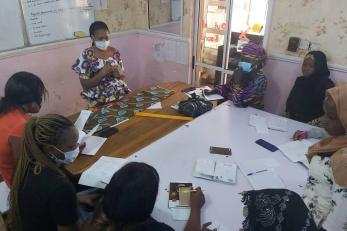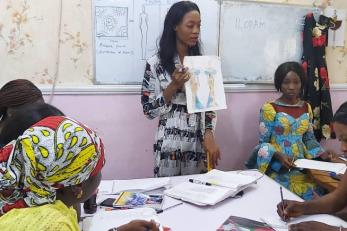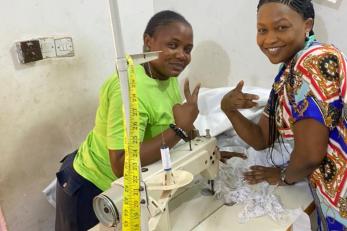How Stella is bridging the unemployment gap in Yola

One of the core objectives of the Feed the Future Nigeria Rural Resilience Activity is to build resilient institutions that contribute to the rebuilding of the economies of the Northeast states.
For Stella Amos Ndzim, a 36-year-old mother of two, who watched her mother sew clothes as a kid, the unemployment rate in Nigeria is not an excuse to be jobless. Having developed a passion for tailoring, she started a fashion designing business after a fruitless job search, following her graduation from the University. Stella’s fashion academy, registered as Zimcy Fashion Academy, started because of the increase in customer base and the need to expand her business. Her Academy trains mostly male and female adolescents and youths on tailoring and fashion design, adopting a semi-formal but structured approach, which contrasts with most artisan systems.
“I started sewing as far back as I was a young girl. But officially 10 years ago, immediately after completing my National Youth Service,” Stella said. “Initially, I started offering apprenticeships whereby students learn what they see us do. But afterward, precisely in 2019, we incorporated the Academy where there is a curriculum for every category: beginners (3 months), intermediary (2 months), and advanced training (2 months).”

Stella is one of the numerous Nigerian youths who ventured into several informal vocations due to the high rate of unemployment caused by lack of job opportunities in the formal sector (white-collar jobs), inadequate job matching skills, poor performance of different sectors of the economy, slow economic growth, slow growth of Industrialization, amongst other factors.
Stella’s fashion hub, based in Yola, Adamawa State is one of the incubation hubs benefitting from the Skills Provider Development Intervention of the Feed the Future Nigeria Rural Resilience Activity.
In December 2021, 33 leaders and instructors of skills provider institutions participated in the Training of Trainers (ToT) for selected leaders and instructors of skills providing institutions, including Technical and Vocational Education and Training (TVET) centers, Vocational Training Centers (VTC), and Business Incubation Hubs, across the Northeast states of Borno, Adamawa, Yobe, and Gombe. The training was conducted using the soft skills curriculum, adapted from Mercy Corps’ trainings for TVET, VTCs, and Business Incubation Hubs.
The leaders and instructors of the selected skills providers institutions were drawn from private and public TVET, VTCs and business incubation hubs. The ToT was part of the ongoing efforts by the Rural Resilience Activity to strengthen instructional delivery within the training centers towards supporting trainees to develop sought-after skills (both hard and soft) by employers of technical and vocational labor, in addition to enhancing leadership, institutional, and organizational capacities.
“After I attended the training on employability curriculum and soft skills, I saw the need to prepare them for the world at large to be job ready. I taught them the importance of building a network of clients around them, how to build their confidence.”

Thanks to the Rural Resilience Activity’s skills development intervention, Stella no longer worries about how long her students can stay in business after graduation from her Academy. According to her, the employability skills training facilitated by the Rural Resilience Activity came at the right time.
“Now I am glad that my students are familiar with critical skills such as identifying the right network of customers, the importance of being creative to stand out, and how to have good customer working relationships. I am certain they will be able to navigate their ways to success”.
Zimcy Fashion Academy is currently planning a graduation ceremony for another set of students, and she is glad she has been able to step down the employability training.